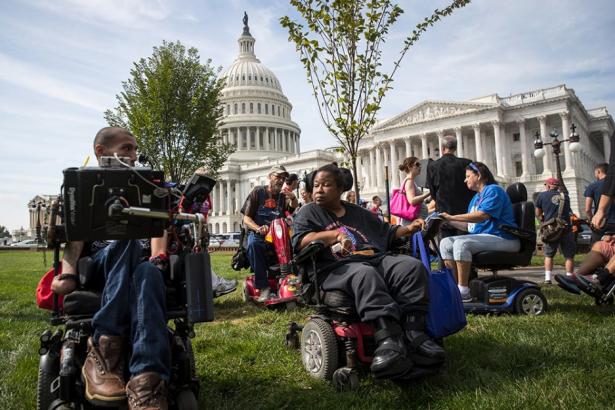Last Friday night I had the fortune of attending Janelle Monae’s concert. I’d been looking forward to it for weeks. I’m a huge Prince fan, and Prince and Monae’s working relationship, the value both place on instrumentation, and Monae’s musical range of influences are all impressive to me. Her showmanship is legendary, and it has a crisp professionalism to it that’s hard not to identify with in a city like D.C.
My husband and I sat in the ADA section towards the back of the main floor—I’m a little person, so the only thing I can see in general seating is other concert-goers butts. The show was extraordinary—it was visually stunning, and emotionally empowering. Towards the end of her set, The Electric Lady took a moment to talk about the dark times we are in and the interdependence of social justice movements. As she rattled them off—telling her fans that we “need to fight for black and brown communities, immigrants, the disability community…” —my jaw fell open. Never, in my (almost) 40 years on this planet, have I heard an artist specifically call out my community, let alone use our preferred language (too often we are called “special needs,” “differently abled,” or “handicapable”). There was a flurry of activity as everyone I was sitting with checked with their seatmate to make sure it had actually happened: That a mainstream artist, at a public event, had just included us in their activism.
Monae was leaning into a shift that we’ve seen take place over the past year. Last month, Ava DuVernay pushed back when fans of Queen Sugar asked her to reverse a character’s Lupus. Many folks felt like having a disability made the character weak. But instead of caving to pressure and “healing” the character, DuVernay focused on how disability adds important complexities. She replied, “espectfully, we can have physical illness and still be whole. That’s what this storyline explores among other things. Many of us live with chronic illness and still we thrive and live and love wholeheartedly.”
I want to be specific about the role black women are playing here. When a community member thanked Brittany Packnett, from Operation Zero and Teach for America, for highlighting the perspectives of the disability community in response to the straw ban and other acts of ableism, Packnett said that it’s “because we’re used to not being listened to.” That open acknowledgement of interdependence makes this feel like it’s part of a bigger movement—the intersectional kind that Monae called for.
We can have illness and still be whole
Most years, this last week in July is the only time that the media turns its attention to people with disabilities. It’s the anniversary of the Americans with Disabilities Act (ADA), so there are usually a smattering of stories about the importance of including people with disabilities in American society. But this year has been different. The ongoing assault on health care has forced the media to grapple with its tendency to cast disabled people as either vulnerable victims or powerful protestors. We’ve seen a phenomenal series of stories by Joe Shapiro talking about sexual assault of people with intellectual and developmental disabilities. We’re seeing on-going discussion of the trauma being experienced by the children at the border, which will follow them for a lifetime. We saw open discussions of mental health rise when Anthony Bourdain and Kate Spade died. We got to watch W. Kamau Bell do a #UnitedShades segment with powerhouse Alice Wong, and Drunk History covered the 504 Sit-ins (the longest occupation of a federal building in U.S. History.)
So it feels appropriate that this is the week that the Center for American Progress (CAP) is launching the Disability Justice Initiative. CAP is the first D.C.-based national progressive organization to have a disability shop, and I am thrilled to build off of the work of folks like Eli Clare, Mia Mingus, and Sins Invalid, to work on cross-movement organizing and to center multiply-marginalized disabled people. The project is working to bring the disability lens across issues progressives are working on, and will also work to get progressives to the table as allies and accomplices fighting for the rights of people with disabilities.
We are setting a big table—a massive table. We’re including people with mobility, sensory, mental health, and learning disabilities, and calling in our siblings with chronic health conditions (like diabetes, migraines, fibromyalgia and IBS/IBD), eating disorders, folks in recovery from substance use, and people living with and learning how to navigate trauma.
There is not a single issue, whether it be health care, paid leave, immigration, climate change, education, or voting, that does not impact the 1 in 5 Americans that lives with a disability. Now that Americans are starting to recognize that—that we are a part of every community, that we are here to fight, and that we are worth fighting for—it is time to formalize our seat at the table. And we’re leaving another seat open for you.
Donate today to help TalkPoverty.org show solutions to poverty in America and lift up the voices of people who are struggling.


Spread the word